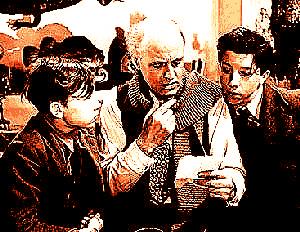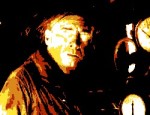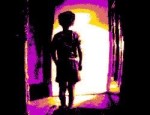Film Review

The film is a charming concoction of light farce and dramatic thriller, in pretty much the manner of a Boy's Own adventure. Most of the parts are played by children, led by Harry Fowler as Joe - he had appeared in an earlier Ealing production, Went the Day Well? (1942). Director Charles Crichton was keen that the film should have a strong sense of realism and so he only hired working class children with recognisable accents (mostly London, but one Scot).
Playing the lead villain, one of the few adult parts in the film, was Jack Warner. He would later become famous as PC George Dixon in another Ealing classic, The Blue Lamp (1950) and its long-running BBC television spin-off, Dixon of Dock Green. The most memorable performance is Alastair Sim's gloriously over-the-top portrayal of a writer of childrens' comics - although regrettably he only appears in a couple of scenes.
The film's screenwriter Tibby Clarke, a former journalist, was significant contributor to the Ealing comedies. He worked on a further six Ealing films, including Passport to Pimlico (1949) and The Lavender Hill Mob (1951). Clarke's great flair for scripting comic situations is abundently apparent in Hue and Cry, a film that continues to have a strong appeal for both adults and children.
© James Travers 2008
The above content is owned by frenchfilms.org and must not be copied.
Film Synopsis
Joe Kirby, a 15 year-old lad living in London's East End, has a passion for adventure stories. When he notices the similarity between a car parked in the street with one he has and seen in his favourite comic, he suspects foul play is afoot. He confides in Inspector Ford, but the latter puts this down to an overactive imagination and finds the boy a job in Covent Garden. However, Joe is convinced that someone is using the comic to convey coded messages. With his gang of friends he sets out to capture a band of crooks...© James Travers
The above content is owned by frenchfilms.org and must not be copied.
Similar Films
Here are some other films you may enjoy watching:- Stage Fright (1950)
- Café de Paris (1938)
- To Catch a Thief (1955)
- The Man Who Knew Too Much (1956)
- Les Disparus de Saint-Agil (1938)
Other related links:
Film Credits
- Director: Charles Crichton
- Script: T.E.B. Clarke
- Cinematographer: Douglas Slocombe
- Music: Georges Auric
- Cast: Alastair Sim (Felix H. Wilkinson), Harry Fowler (Joe Kirby), Douglas Barr (Alec), Joan Dowling (Clarry), Jack Warner (Nightingale), Valerie White (Rhona), Jack Lambert (Ford), Ian Dawson (Norman), Gerald Fox (Dicky), David Simpson (Arthur), Albert Hughes (Wally), John Hudson (Stan), David Knox (Dusty), Jeffrey Sirett (Bill), James Crabbe (Terry), Stanley Escane (Roy), Frederick Piper (Mr. Kirby), Vida Hope (Mrs. Kirby), Heather Delaine (Dorrie Kirby), Joe E. Carr (Short)
- Country: UK
- Language: English
- Support: Black and White
- Runtime: 82 min
The silent era of French cinema

The very best sci-fi movies

The Golden Age of French cinema
